
A spouse is a significant other in a marriage. The word 'spouse' can only ever be used when a couple is married legally or by common law. A male spouse is called a husband while a female spouse is called a wife.
Child marriage is a marriage or domestic partnership, formal or informal, usually between a child and an adult, but can also be between a child and another child.
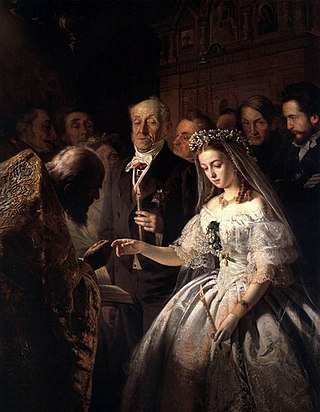
Forced marriage is a marriage in which one or more of the parties is married without their consent or against their will. A marriage can also become a forced marriage even if both parties enter with full consent if one or both are later forced to stay in the marriage against their will.
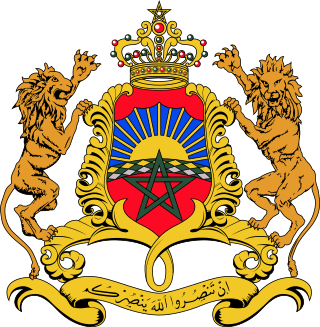
The Mudawana, short for mudawwanat al-aḥwāl ash-shakhṣiyyah, is the personal status code, also known as the family code, in Moroccan law. It concerns issues related to the family, including the regulation of marriage, polygamy, divorce, inheritance, and child custody. Originally based on the Maliki school of Sunni Islamic jurisprudence, it was codified after the country gained independence from France in 1956. Its most recent revision, passed by the Moroccan parliament in 2004, was praised by human rights activists for its measures to address women's rights and gender equality within an Islamic legal framework.

Feminism in Japan began with women's rights movements that date back to antiquity. The movement started to gain momentum after Western thinking was brought into Japan during the Meiji Restoration in 1868. Japanese feminism differs from Western feminism in that less emphasis is placed on individual autonomy.

Traditional Sunni and Shia Islamic marital jurisprudence allows Muslim men to be married to multiple women. Men can have up to four wives at a time according to the islamic jurisprudence.
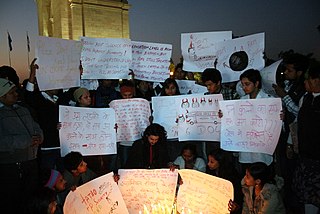
Feminism in India is a set of movements aimed at defining, establishing, and defending equal political, economic, and social rights and opportunities for women in India. It is the pursuit of women's rights within the society of India. Like their feminist counterparts all over the world, feminists in India seek gender equality: the right to work for equality in wages, the right to equal access to health and education, and equal political rights. Indian feminists also have fought against culture-specific issues within India's patriarchal society, such as inheritance laws.

Women's rights in Afghanistan are severely restricted by the Taliban. In 2023, the United Nations termed Afghanistan as the world's most repressive country for women. Since the US troops withdrawal from Afghanistan in 2021, the Taliban gradually imposed restrictions on women's freedom of movement, education, and employment. Women are banned from studying in secondary schools and universities, making Afghanistan the only country to prohibit females from studying beyond the sixth grade. Women are not allowed in parks, gyms, or beauty salons. They are forbidden from going outside for a walk or exercise, from speaking or showing any part of their face or body outside the home, or even from singing or reading from within their own homes if they could be heard by strangers outside. In extreme cases, women have reportedly been subjected to gang-rape and torture in Taliban prisons.

The status of women in Nepal has varied throughout history. In the early 1990s, like in some other Asian countries, women in Nepal were generally subordinate to men in virtually every aspect of life. Historically, Nepal has been a predominantly patriarchal society where women are generally subordinate to men. Men were considered to be the leader of the family and superior to women. Also, social norms and values were biased in favor of men. This strong bias in favor of sons in society meant that daughters were discriminated against from birth and did not have equal opportunities to achieve all aspects of development. Daughters were deprived of many privileges, including rights, education, healthcare, parental property rights, social status, last rites of dead parents, and were thought to be other's property and liabilities. In the past century, there has been a dramatic positive change in the role and status of women in Nepal, reducing gender inequality. While the 1990 Constitution guaranteed fundamental rights to all citizens without discrimination on the basis of ethnicity, caste, religion, or sex, the modernization of society, along with increased education of the general population, have also played an important role in promoting gender equality. The roles of women have changed in various ways in the modern Nepalese society.

Women in Russia have a rich and varied history during numerous regimes throughout the centuries. Since Russian society is multicultural, the experiences of women in Russia vary significantly across ethnic, religious, and social lines. The life of an ethnic Russian woman can be dramatically different from the life of women of minority groups like the Bashkirs and the life of a woman from a lower-class rural family can be different from the life of a woman from an upper-middle-class urban family. Nevertheless, a common historical and political context provides a framework for speaking about women in Russia in general.
This page examines the dynamics surrounding women in Tajikistan.
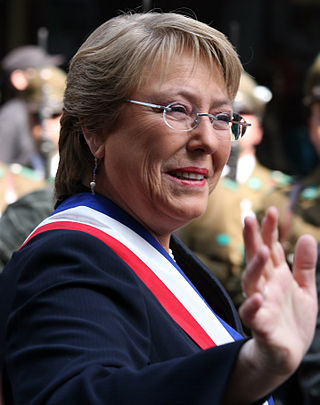
The lives, roles, and rights of women in Chile have gone through many changes over time. Chilean women's societal roles have historically been impacted by traditional gender roles and a patriarchal culture, but throughout the twentieth century, women increasingly involved themselves in politics and protest, resulting in provisions to the constitution to uphold equality between men and women and prohibit sex discrimination.

The status of women in Taiwan has been based on and affected by the traditional patriarchal views and social structure within Taiwanese society, which put women in a subordinate position to men, although the legal status of Taiwanese women has improved in recent years, particularly during the past three decades when the family law underwent several amendments. Throughout history, women in Taiwan had suffered various forms of discrimination, including foot binding.
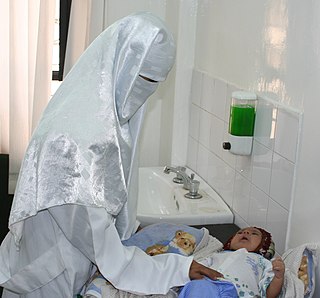
Women in Yemen suffer from gender-based discrimination due to the highly patriarchal character of Yemeni society. Although the government of Yemen has made efforts to improve the rights of women, many cultural and religious norms stand in the way of equal rights for women. Poor enforcement of the legislation by the Yemeni government exacerbates the problem.
Since the December 2010 revolution in Tunisia and protests across the Middle East and North Africa (MENA) began, Tunisian women have played an unprecedented part in the protests. Habib Bourguiba began instituting secular freedoms for women in 1956, such as access to higher education, the right to file for divorce, and certain job opportunities. Women in Tunisia enjoy certain freedoms and rights that are denied to women in neighboring countries, although the social norms have shifted since 2011.
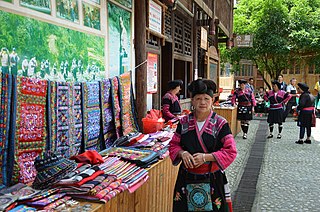
In 2021, China ranked 48th out of 191 countries on the United Nations Development Programme's Gender Inequality Index (GII). Among the GII components, China's maternal mortality ratio was 32 out of 100,000 live births. In education 58.7 percent of women age 25 and older had completed secondary education, while the counterpart statistic for men was 71.9 percent. Women's labour power participation rate was 63.9 percent, and women held 23.6 percent of seats in the National People's Congress. In 2019, China ranked 39 out of the 162 countries surveyed during the year.
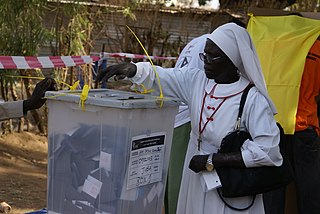
Women in South Sudan are women who live in and are from South Sudan. Since the Independence of South Sudan on 9 July 2011, these women have gained more power but still face issues of inequality. Many women in this area do not have adequate access to health resources and education. While these women often face inequality, there has been progress since South Sudan's official declaration of independence. In recent years, this inequality has gained national attention and people have become more interested in the issue of child marriage that this area faces. Along with this, there has started to be a focus on the very high level of maternal mortality in South Sudan. With a maternal mortality rate of 789 deaths per 100,000 live births, South Sudan has one of the highest rates in the world.

Women in Bulgaria refers to women who live in and are from Bulgaria. Women's position in Bulgarian society has been influenced by a variety of cultures and ideologies, including the Byzantine and Ottoman cultures, Eastern Orthodox Christianity, communist ideology, and contemporary globalized Western values.
Gender inequality has been improving a lot in Bangladesh, inequalities in areas such as education and employment remain ongoing problems so women have little political freedom. In 2015, Bangladesh was ranked 139 out of 187 countries on the Human Development Index and 47 out 144 countries surveyed on the Gender Inequality Index in 2017. Many of the inequalities are result of extreme poverty and traditional gender norms centred on a patrilineal and patriarchal kinship system in rural areas.
A marry-your-rapist law, marry-the-rapist law, or rape-marriage law is a rule of rape law in a jurisdiction under which a man who commits rape, sexual assault, statutory rape, abduction or other similar act is exonerated if he marries his female victim, or in some jurisdictions at least offers to marry her. The "marry-your-rapist" law is a legal way for the accused to avoid prosecution or punishment.















